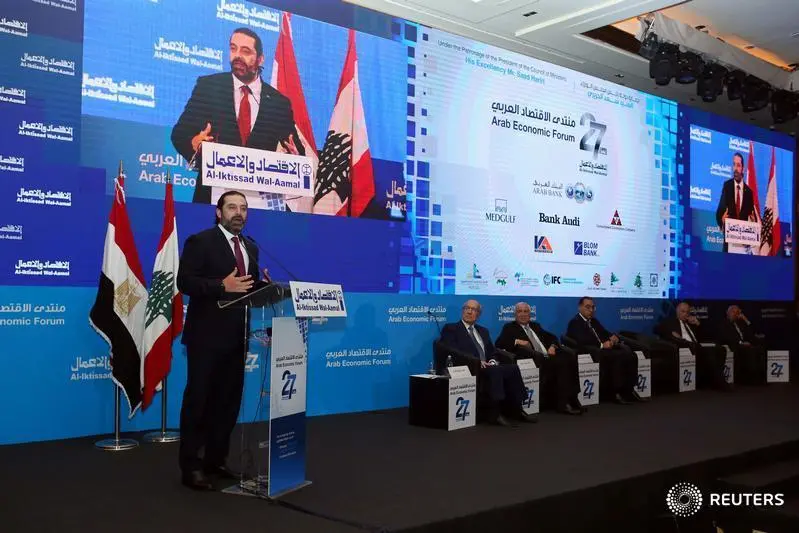PHOTO
BEIRUT: Prime Minister Saad Hariri said Thursday that Lebanon should follow the example of Egypt in economic and financial reforms, as a leading banker warned against increasing taxes on interest on customer deposits.
The most important common challenge today in the Arab countries is to stimulate growth and diversify its sources to create jobs for our youth, Hariri said, speaking at the opening of the 27th edition of the Arab Economic Forum, organized by Al-Iktissad Wal-Aamal at Beiruts Four Seasons Hotel.
He praised the effective efforts of the Egyptian government to implement reforms and achieve high gross domestic product growth.
We have to learn from the Egyptian experience and expertise, whether in the fields of electricity, communications, gas, oil or other sectors. What we are trying to do today in Lebanon is actually the same as Egypt did, but the difference is that Egypt suffered economically more than Lebanon, the prime minister said.
Hariri warned that Lebanon had limited choices to reform its economy. Today we have a choice in Lebanon. Do we want to reach a place where we fall economically?
Or look at Egypt ... and say that this is the experience we should implement? Hariri said.
As Prime Minister [Mostafa] Madbouly said, we look at China and see where it is.
For 30 years, it has been changing its programs, and it decided that it wants to be the leader in terms of artificial intelligence.
Egypt has also decided that it wants to develop itself within the next 10 to 15 years and become a developed country as it was in the past, Hariri said.
He cited the example of Gulf Arab states that also implemented reforms and opened up their economies. We in Lebanon want to do this. In the Gulf, there are changes and openness. Today we see it in Egypt. Hopefully, it will extend to the entire Arab world so that we are one team and work together. The Lebanese-Egyptian [Joint] Higher Committee is moving along this path.
If the Silk Road will pass through our entire region, we must build the path of the Arab states so that our economies develop, Hariri said.
The President of the Association of Banks in Lebanon Joseph Torbey also warned against any attempt by the government to raise taxes on interest on customer deposits, as it did in 2017.
He added that Lebanese banks hoped to see the government succeed in agreeing an austerity budget, and called for a fundamental reduction in spending.
But, addressing the forum, Torbey warned against underestimating the impact of subjecting the banking system and its deposits to seasonal taxes at every opportunity, as happened last year, a reference to a new levy imposed in 2018.
This may be repeated today through raising the tax rate on deposit interest to 10 percent, affecting capital flows to Lebanon, weakening the ability of the banking sector to play its financing role, negatively affecting interest rates and the cost of financing the Lebanese economy, and obstructing growth.
Torbey was alluding to reports that the government could mull increasing taxes on interest income deposits from 7 to 10 percent.
ABL has warned of grave economic consequences if the government contemplates more taxes in the new budget.
ABL considers that the tax package approved by the House of Representatives in 2017 to finance the salary scale led, as expected by the economic bodies, to a negatively impact the national economy. This has caused the closure of several institutions, dismissal of employees, decline of growth to almost negative levels, increase in unemployment, surge in inflation and unprecedented rise in the balance of payments deficit, a statement from the association said Wednesday.
Egypts prime minister briefed forum participants on the economic reforms carried out by the government over the past few years.
Egypt has already begun to reap some fruits and the positive results of the reforms and efforts exerted during the recent period.
Egypt has recorded the highest annual growth rate in 10 years, reaching 5.3 percent during the fiscal year 2017-2018, while the balance of payments surplus stood at $12.8 billion.
The volume of foreign exchange reserves increased from $14.9 billion in June 2014 to reach $44 billion in February 2019, to cover about eight months of commodity imports after covering three a month only, he added.
Other speakers shed light on growing unemployment and poverty among Arab youth. They said Arab governments could not keep ignoring the acute economic problems engulfing most parts of the Arab world.
Copyright 2019, The Daily Star. All rights reserved. Provided by SyndiGate Media Inc. (Syndigate.info).





















